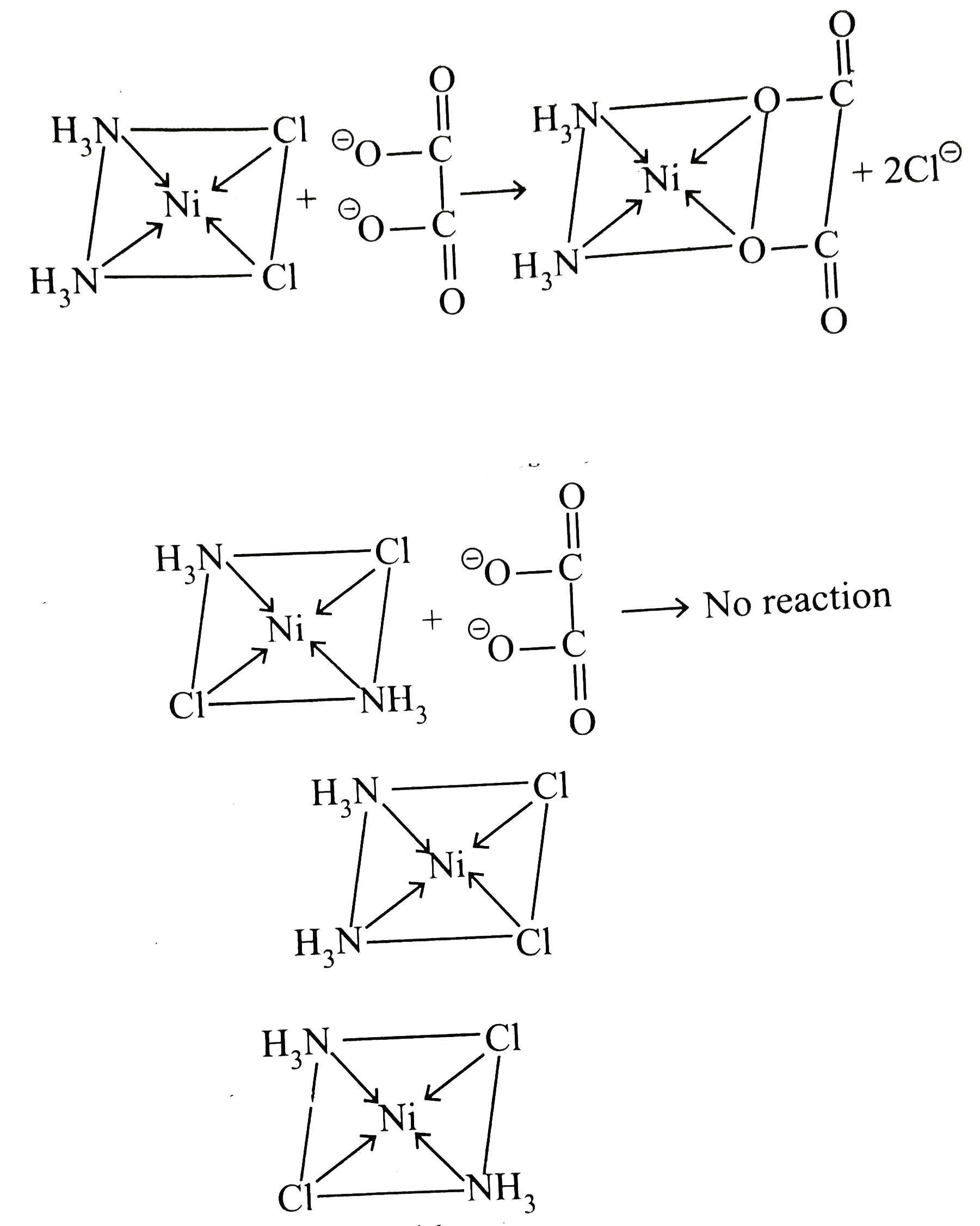When [Ni(NH3)4]2+ is treated with conc HCI two compounds having the formula Ni(NH3)CI2 (designated as I and II are formed) I can be converted into II ny boiling in dil HCI A solution of I reacts with oxalic acid to form Ni(NH3)2(C2O4) II does not react with oxalic acid Deduce the configuration Of I and II and the geometry of Ni (II) complexes .
[Ni(NH3)4]2++HCI→Ni(NH3)2CI2
conc (I and II)
Idil.HCI−−−−→II
IOxalicacid−−−−−−→Ni(NH3)2(C2O4)
IiOxalicacid−−−−−−→No reaction
C2O2−4 ion is acting a bidentate ligand and forms chelate ring since I isomer of Ni(NH3)2CI2 form Ni(NH3)2C2O4 this indicates that two CIΘ ions in I are present at cis position

II isome of Ni(NH3)2CI2 does not react with C2O2−4 ion means that the 2CIΘ are present at trans position
cis diamminedichlordonicke1(II)
trans-diamminedichloridonickel (II) .
Topper's Solved these Questions
- BOOK - CENGAGE CHEMISTRYCHAPTER - COORDINATION COMPOUNDSEXERCISE - Solved Examples42videos
COORDINATION COMPOUNDS
- BOOK - CENGAGE CHEMISTRYCHAPTER - COORDINATION COMPOUNDSEXERCISE - Ex 7.1 Subjective (Terminology)5videos
COORDINATION COMPOUNDS
- BOOK - CENGAGE CHEMISTRYCHAPTER - CHEMICAL KINETICSEXERCISE - Archives Subjective23videos
CHEMICAL KINETICS
- BOOK - CENGAGE CHEMISTRYCHAPTER - D AND F BLOCK ELEMENTSEXERCISE - Archives Subjective29videos
D AND F BLOCK ELEMENTS
Similar Questions
When [Ni(NH3)4]2+ is treated with conc HCI, two compounds having the formula Ni(NH3)(2)CI2 are formed. A solution of I reacts with oxalic acid to form Ni(NH3)2(C2O4). II does not react with oxalic acid. Deduce the configuration of I and II and the geometry of Ni (II) complexes .
View SolutionFind the change in magnetic moment when [Ni(H2O)6]2+ is converted into [Ni(NH3)6]2+
View Solution
Knowledge Check
- Question 1 - Select One
On treatment of [Pt(NH3)4]2+ with concentrated HCI, two compounds (P) and (Q) having the same formula, [Pt(NH3)2CL2] are obtained, (P) can be converted into (Q) by boiling with dilute HCI. A soution of (P) reacts with oxalic acid to form [Pt(NH3)2(C2O4)] whereas (Q) does not react. Point out the correct statement of the following :
A(P) cis, (Q) trans, both tetrahedralB(P) cis, (Q) trans, both square planarC(P) trains, (Q) cis, both tetrahedralD(P) trans, (Q) cis, both square planar - Question 2 - Select One
On treatment of [Pt(NH3)4]2+ with concentrated HCI, two compounds (P) and (Q) having the same formula, [Pt(NH3)2CL2] are obtained, (P) can be converted into (Q) by boiling with dilute HCI. A soution of (P) reacts with oxalic acid to form [Pt(NH3)2(C2O4)] whereas (Q) does not react. Point out the correct statement of the following :
A(P) cis, (Q) trans, both tetrahedralB(P) cis, (Q) trans, both square planarC(P) trains, (Q) cis, both tetrahedralD(P) trans, (Q) cis, both square planar - Question 3 - Select One
[Ni(NH3)2]2+Conc.HCl−−−−−→A+B
The molecular formula of both A and B is same.
A can be converted to B by boiling in dil. HCl.
A on reaction with oxalic acid yields a complex having the formula Ni(NH3)2(C2O4) but B does not.
From the above information we can say thatAA is square planar but B is tetrahedralBA and B both are tetrahedral A is optically active compound whereas B is optically inactiveCboth A and B are square planar A is transisomer and B is cis-isomerDboth A and B are square planar A is cis-isomer and B is trans -isomer.
Find the change in magnetic moment when [Ni(H2O)6]2+ is converted into [Ni(NH3)6]2+
View SolutionDraw the structure of: (i) [Ni(CO)4] (ii) [Fe(H2O)6]+3
View SolutionHow does acidified KMnO solution react with the following:
(i) FeSO4 (i) SO2 (ii) Oxalic acid (iv) KI (v) H2O2View SolutionOn treatment of [Pt(NH3)4]2+ with Cl compound I is formed When [PtCl4]2− reacted with aq. NH3 the complex II is formed. Point out the correct statement.
View SolutionStatement I: Only cis Pt(NH3)2Cl2 reacts with oxalic acid (H2C2O4) to form [PtCl2(ox)]2− not the trans isomer.
Statement II: The oxalate ion is a bidentate ligand which occupies adjacent positions only.View Solution

